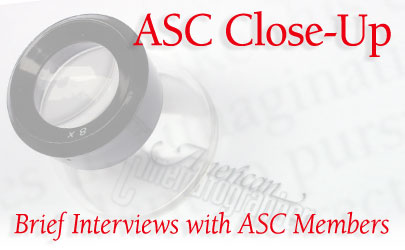 |
||||
 |
|
|||
| Levie Isaacks, ASC |
|
|||
When you were a child, what film made the strongest impression on you? The Treasure of the Sierre Madre. Its visuals made a strong impression on me, and I felt, as a young boy, that I really learned what it meant to be greedy. Which cinematographers, past or present, do you most admire? There are so many, and I love watching the results of their work. One stands out, however: Conrad Hall, ASC. His agent told me that a number of well-known cinematographers turned down Searching for Bobby Fischer because it was a small picture with no visual opportunities. Conrad really took his craft to an art form in that picture. What sparked your interest in photography? I bought a really good 35mm still camera when I was in the service in Vietnam. I was drawn to the experience of capturing life there. Where did you study and/or train? I was fortunate to get a job at a local TV station while attending the University of Texas. There I was given a Bell & Howell DR-70, and I fell in love with the movie camera. I took photography courses in college and numerous lighting seminars, but mostly I learned by doing. Who were your early teachers or mentors? Victor Kemper, ASC and Woody Omens, ASC, who both taught hands-on workshops at the Maine Photographic Workshops. They changed the way I look at light. What are some of your key artistic influences? Documentary photographers W. Eugene Smith and Henri Cartier Bresson, for showing us how to make a difference with photography. How did you get your first break in the business? A sound recordist, Mark Ullano, recommended me to director Howard Cohen for a movie at Concorde Pictures, Saturday the 14th Strikes Back (1988). Since that picture, I have worked regularly in the business. What has been your most satisfying moment on a project? I once suggested a shot to a director on Malcolm in the Middle and Linwood Boomer, the creator of the show, intervened and said he would never use a shot like that. I set it up anyway, and when Linwood saw it, he changed his mind. That experience reminded me to keep trusting my instincts. Have you made any memorable blunders? I was doing second unit on a picture, and I made a list of lighting equipment for the shots requested. The producer, who was also the second-unit director, told me all he wanted was to see some headlights in the distance, so I did not need to light the shot. I disagreed but went ahead and did it his way. They were unhappy with the shot, as I’d suspected they would be. I was fired, and the next guy got the lighting package I’d asked for. What’s the best professional advice you’ve ever received? I was told that Hollywood was a work-ethic town: do the work the very best you can and that will count the most. I have found it to be true. What recent books, films or artworks have inspired you? A couple of films I saw recently stand out in my mind: The Secret Garden and A Little Princess. Both are small pictures, yet they are still great testaments to visual storytelling. Do you have any favorite genres, or genres you would like to try? I would like to do an epic. Lawrence of Arabia is probably my favorite movie, and Freddie Young, BSC is another of my favorite cinematographers. If you weren’t a cinematographer, what might you be doing instead? I was planning on being a lawyer, but the camera found me, and I am very thankful. Which ASC cinematographers recommended you for membership? Stephen Lighthill, Brad Six and Steve Shaw. How has ASC membership impacted your life and career? The future of our craft and our business is being heavily impacted by the coming of digital photography. The ASC Technology Committee is making a significant contribution to ensuring that cinematographers are heard by the manufacturers and studios. I believe this outreach effort is the most important thing the ASC is doing now, and that it will impact cinematography for years to come. The ASC is the voice of cinematographers, and we need to speak loud and clear. |
|
|||
|
<< prev |
||||
|
|
|
|
|
|


